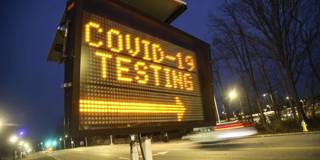The US is facing a major health and economic catastrophe for one simple reason: its existing COVID-19 testing infrastructure has broken down. There is still time to build a new system that enables policymakers and the public to understand where outbreaks are occurring and where they are likely to occur next.
WASHINGTON, DC – To track the presence of SARS-CoV-2, the virus that causes COVID-19, the United States is relying heavily on polymerase chain reaction (PCR) live virus testing at massive scale. In the most common version of this approach, samples – nasal swabs or saliva – are sent to relatively large labs, with the goal of returning results within 24-48 hours. Unfortunately, while some priority tests receive speedy turnaround, it now typically takes 7-22 days to get results across most of the country. For a fast-moving virus like SARS-CoV-2, which can progress from infection to final outcome (death or recovery) in as little as eight days, long delays mean that PCR virus testing is a waste of time and money. By the time you know the result, it is too late to do anything different.

WASHINGTON, DC – To track the presence of SARS-CoV-2, the virus that causes COVID-19, the United States is relying heavily on polymerase chain reaction (PCR) live virus testing at massive scale. In the most common version of this approach, samples – nasal swabs or saliva – are sent to relatively large labs, with the goal of returning results within 24-48 hours. Unfortunately, while some priority tests receive speedy turnaround, it now typically takes 7-22 days to get results across most of the country. For a fast-moving virus like SARS-CoV-2, which can progress from infection to final outcome (death or recovery) in as little as eight days, long delays mean that PCR virus testing is a waste of time and money. By the time you know the result, it is too late to do anything different.